
The foreign policy of the Netherlands is based on four basic commitments: to the Atlantic cooperation, to European integration, to international development and to international law. While historically the Kingdom of the Netherlands was a neutral state, since 1945 it has become a member of NATO, the United Nations, the European Union and many other international organizations. The Dutch economy is very open and relies on international trade. During and after the 17th century—its Golden Age—the Dutch built up a commercial and colonial empire. It was a leading shipping and naval power and was often at war with England, its main rival. Its main colonial holding was Indonesia, which fought for and achieved independence after 1945. The historical ties inherited from its colonial past still influence the foreign relations of the Netherlands. Foreign trade policy is handled by the European Union. The Dutch have been active in international peacekeeping roles.

The cabinet of the Netherlands is the main executive body of the Netherlands. The current cabinet of the Netherlands is the Schoof cabinet, which has been in power since 2 July 2024. It is headed by Prime Minister Dick Schoof.

Abortion in the Netherlands was fully legalized on 1 November 1984, allowing elective abortion up to the 24th week of the pregnancy. Abortion for "serious medical reasons" can be performed after 24 weeks. There used to be a mandatory five-day waiting period for abortions done after one's menstrual period is 17 days overdue. However, on 21 June 2022, Dutch parliament approved a law to scrap the mandatory five-day reflection period before undergoing an abortion, saying women with a joint consultation with the doctor, should be able to determine the time before making a decision. The law went into effect in January 2023.

The Royal Netherlands Army is the land branch of the Netherlands Armed Forces. Though the Royal Netherlands Army was raised on 9 January 1814, its origins date back to 1572, when the Staatse Leger was raised making the Dutch standing army one of the oldest in the world. It fought in the Napoleonic Wars, World War II, the Indonesian War of Independence and the Korean War, as well as served with NATO on the Cold War frontiers in West Germany from the 1950s to the 1990s.

The Ministry of General Affairs is the Dutch Ministry responsible for government policy, planning, information, and the Dutch royal house. The Ministry was created in 1937 and dissolved in 1945, but in 1947 it was reinstated by Prime Minister Louis Beel. The Ministry remained small until 1967, when it was greatly expanded by Prime Minister Piet de Jong. Since his premiership the Ministry has continued to expand to the present day. The Minister of General Affairs is the head of the Ministry who is also Prime Minister and a member of the Cabinet of the Netherlands. The current Minister and Prime Minister is Dick Schoof.
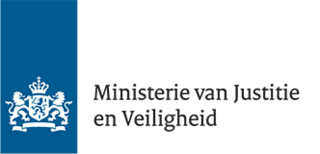
The Ministry of Justice and Security is the Dutch ministry responsible for justice, imprisonment and public security. The ministry was created in 1798 as the Department of Justice, before it became in 1876 the Ministry of Justice. In 2010, it took over the public safety duties from the Ministry of the Interior and Kingdom Relations and became Ministry of Security and Justice. In 2017 the ministry was renamed to Ministry of Justice and Security.

The Ministry of the Interior and Kingdom Relations is the Netherlands' ministry responsible for domestic policy, civil service, public administration, elections, relations with local governments, intelligence, and kingdom relations.

The Ministry of Foreign Affairs is the Netherlands' ministry responsible for foreign relations, foreign policy, international development, international trade, diaspora and matters dealing with the European Union, NATO and the Benelux Union. The ministry was created in 1798, as the Department of Foreign Affairs of the Batavian Republic. In 1876, it became the Ministry of Foreign Affairs.
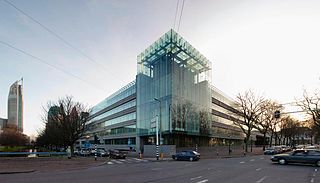
The Ministry of Finance is the Dutch Ministry responsible for economic policy, monetary policy, fiscal policy, tax policy, incomes policy, financial regulation, the government budget and the financial market. The Ministry was created in 1798 as the Department of Finance of the Batavian Republic. It became the Ministry of Finance in 1876. The Minister of Finance is the head of the Ministry and a member of the Cabinet of the Netherlands. The current Minister is Eelco Heinen.

Joris Jacob Clemens Voorhoeve is a retired Dutch politician, diplomat of the People's Party for Freedom and Democracy (VVD) and political scientist.
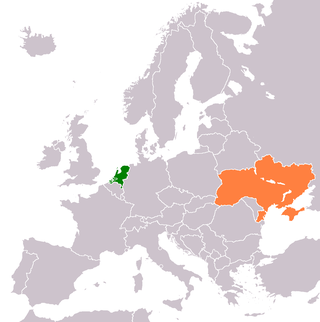
Netherlands–Ukraine relations are foreign relations between the Netherlands and Ukraine. The two countries established diplomatic relations in 1992. Notable incidents in their relations include was the shoot-down of Malaysia Airlines Flight 17 in 2014 and the 2016 Dutch Ukraine–European Union Association Agreement referendum. the Netherlands is a member of the European Union, which Ukraine applied for in 2022. Both countries are full members of Council of Europe.

The Ministry of Economic Affairs is the Netherlands' ministry responsible for international trade, commercial, industrial, investment, technology, space policy, as well as tourism.

The Korps Commandotroepen (KCT) is the elite special forces unit of the Royal Netherlands Army. The KCT traces its origins to the Second World War with the founding of No. 2 (Dutch) Troop, and the founding of the Korps Speciale Troepen during the Indonesian War of Independence. At present, the unit is tasked with conducting the full spectrum of special operations, its principal tasks being direct action, special reconnaissance, military assistance and counter-terrorism.
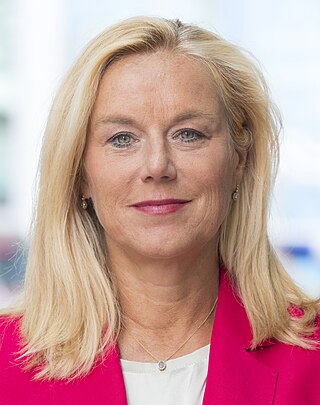
Sigrid Agnes Maria Kaag is a Dutch politician, humanitarian and diplomat who is the UN Senior Humanitarian and Reconstruction Coordinator for Gaza since 2024. Kaag most recently served in the fourth Rutte cabinet as First Deputy Prime Minister of the Netherlands and Minister of Finance from 2022 to 2024 and has previously served as Minister for Foreign Trade and Development Cooperation and Minister of Foreign Affairs. She was Leader of the Democrats 66 (D66) from 2020 to 2023.

Martin Wijnen is a Dutch retired military officer and government official who currently serves as the director general of Rijkswaterstaat since January 1, 2024. A retired lieutenant general, he previously served as the fifth Commander of the Royal Netherlands Army before stepping down in 2024. Wijnen also previously served as the Commander of the 43 Mechanized Brigade.

Diplomatic relations exist between Azerbaijan and the Netherlands. Azerbaijan have an embassy in The Hague. the Netherlands has an embassy in Baku. Both countries are full members of the Council of Europe. Azerbaijan celebrated its 30th anniversary with the Netherlands on April 1, 2022.
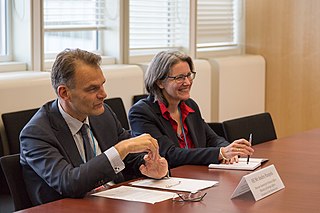
André Haspels is a Dutch diplomat currently serving as the Dutch Ambassador to China since 2023. He previously served as ambassador in Vietnam and South Africa and most recently as ambassador in the United States.
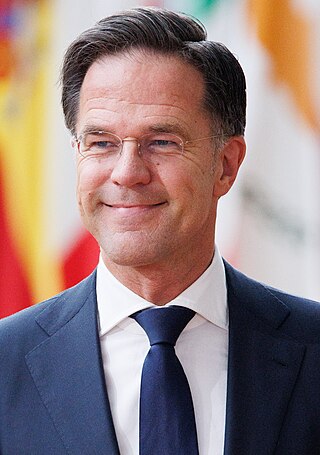
The fourth Rutte cabinet was the cabinet of the Netherlands from 10 January 2022 until 2 July 2024. The cabinet was a continuation of the third Rutte cabinet and was formed by the conservative liberal People's Party for Freedom and Democracy (VVD), the social liberal Democrats 66 (D66) and the Christian democratic Christian Democratic Appeal (CDA) and Christian Union (CU) after the election of 2021. The cabinet fell on 7 July 2023, after failing to reach an agreement on separate treatment of refugees fleeing from war. It continued serving as a demissionary cabinet until the Schoof cabinet was sworn in on 2 July 2024.
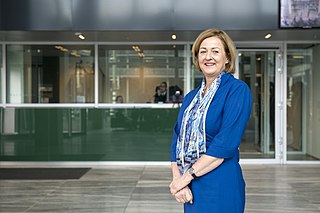
Johanna M. G. (Joke) Brandt, also known internationally as Yoka Brandt, is a Dutch diplomat, administrator and civil servant who served as her country's Permanent Representative to the United Nations in New York from 2020 to 2024. She was previously Deputy Executive Director of UNICEF (2012−2016) and the Dutch ambassador to Uganda (2000−2004) and Eritrea (2000−2004).
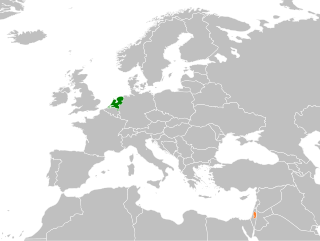
Netherlands–Palestine relations refers to the relationship between Netherlands and Palestine. Netherlands does not recognize Palestine.


















